Dark spots and pigmentation are common skin concerns faced by many people worldwide. They can be caused by various factors such as sun exposure, hormonal changes, aging, acne scars, or even genetics. While these skin issues aren’t harmful, they can sometimes affect confidence. The good news? The right serum can work wonders in improving skin tone and reducing the appearance of dark spots and pigmentation. Let’s delve into what makes a serum effective and explore some of the best options available.

What Causes Dark Spots and Pigmentation?
Before diving into the best serums, it’s essential to understand the root causes of dark spots and pigmentation. These skin issues arise due to an overproduction of melanin, the pigment responsible for skin color. Common triggers include:
- Sun Exposure: Ultraviolet (UV) rays stimulate melanin production, leading to sunspots or age spots.
- Hormonal Changes: Conditions like melasma often occur during pregnancy or with the use of hormonal contraceptives.
- Post-Inflammatory Hyperpigmentation (PIH): This results from skin inflammation caused by acne, injuries, or treatments like laser therapy.
- Aging: As the skin matures, it becomes more prone to discoloration.
- Genetics: Some people are more genetically predisposed to pigmentation issues.

Key Ingredients to Look For in Serums
Effective serums contain active ingredients that target dark spots and even out skin tone. Here are some powerhouse components to keep an eye on:
- Vitamin C:
- A potent antioxidant that brightens skin and reduces pigmentation by inhibiting melanin production.
- Protects the skin from free radical damage caused by sun exposure.
- Niacinamide:
- A form of Vitamin B3 that lightens dark spots and improves skin barrier function.
- Known for its anti-inflammatory properties, making it great for acne-prone skin.
- Alpha Arbutin:
- Derived from bearberry plants, this ingredient reduces melanin synthesis and fades dark spots.
- Hydroquinone:
- A dermatologist-favorite for treating hyperpigmentation, though often used under medical supervision.
- Azelaic Acid:
- Works to gently exfoliate the skin, reducing pigmentation and redness.
- Kojic Acid:
- Derived from fungi, this ingredient inhibits melanin production, promoting a brighter complexion.
- Retinol:
- A form of Vitamin A that speeds up cell turnover, helping to fade dark spots over time.
- Licorice Root Extract:
- Contains glabridin, which helps lighten pigmentation and provides anti-inflammatory benefits.
- Tranexamic Acid:
- A lesser-known ingredient that’s gaining traction for its ability to reduce discoloration and even out skin tone.
- AHAs and BHAs:
- Alpha Hydroxy Acids (like glycolic acid) and Beta Hydroxy Acids (like salicylic acid) exfoliate the skin, improving texture and tone.

The Best Serums for Dark Spots and Pigmentation
- SkinCeuticals C E Ferulic:
- Key Ingredients: Vitamin C, Vitamin E, Ferulic Acid.
- Why It Works: This cult-favorite serum combines antioxidants to brighten the skin, protect against environmental damage, and fade dark spots.
- Best For: All skin types, especially those dealing with sunspots.
- The Ordinary Alpha Arbutin 2% + HA:
- Key Ingredients: Alpha Arbutin, Hyaluronic Acid.
- Why It Works: This affordable option targets hyperpigmentation and hydrates the skin simultaneously.
- Best For: Budget-friendly skincare enthusiasts.
- Murad Rapid Age Spot and Pigment Lightening Serum:
- Key Ingredients: Hydroquinone, Glycolic Acid.
- Why It Works: Hydroquinone reduces dark spots, while glycolic acid exfoliates to reveal brighter skin.
- Best For: Stubborn pigmentation.
- Paula’s Choice 10% Niacinamide Booster:
- Key Ingredients: Niacinamide, Vitamin C.
- Why It Works: This serum improves uneven skin tone and minimizes pores, delivering visible results.
- Best For: Oily and combination skin.
- Sunday Riley Good Genes All-In-One Lactic Acid Treatment:
- Key Ingredients: Lactic Acid.
- Why It Works: This exfoliating serum sloughs off dead skin cells, revealing a radiant complexion and reducing dark spots.
- Best For: Dull and textured skin.
- Drunk Elephant C-Firma Day Serum:
- Key Ingredients: Vitamin C, Ferulic Acid, Pumpkin Extract.
- Why It Works: This serum delivers an antioxidant boost while gently exfoliating to reduce pigmentation.
- Best For: Normal to dry skin types.
- Eucerin Anti-Pigment Dual Serum:
- Key Ingredients: Thiamidol, Hyaluronic Acid.
- Why It Works: The unique combination of thiamidol reduces melanin production, effectively lightening dark spots. This serum is widely available in Europe and many Asian markets, though its availability in North America may vary.
- Best For: Sensitive skin.
- La Roche-Posay Mela-D Pigment Control Glycolic Acid Serum:
- Key Ingredients: Glycolic Acid, Kojic Acid, Vitamin C.
- Why It Works: This dermatologically-tested serum visibly reduces discoloration with its potent blend of actives.
- Best For: Sun-induced dark spots.
- PCA Skin Pigment Gel:
- Key Ingredients: Hydroquinone, Kojic Acid.
- Why It Works: Targets stubborn pigmentation and delivers noticeable results within weeks.
- Best For: Persistent dark spots.
- Melano CC Intensive Anti-Spot Essence:
- Key Ingredients: Vitamin C, Vitamin E.
- Why It Works: This Japanese serum brightens skin, reduces dark spots, and is lightweight for daily use. It is commonly found in Japan and Southeast Asia, and it can also be ordered online in many other regions.
- Best For: Lightweight, non-sticky application.

How to Use Serums Effectively
To maximize the benefits of your serum, follow these steps:
- Cleanse: Start with a clean face to remove dirt, oil, and makeup.
- Tone: Use a toner to prep the skin and restore its pH balance.
- Apply Serum: Take a few drops of serum and gently pat it onto your face and neck.
- Moisturize: Seal in the serum with a good moisturizer to keep your skin hydrated.
- SPF is a Must: Always finish your routine with sunscreen in the morning. UV protection is essential to prevent further pigmentation.

Tips for Choosing the Right Serum
- Know Your Skin Type: Some serums work better for oily skin, while others are tailored for dry or sensitive skin.
- Patch Test: Always test a new product on a small patch of skin to avoid adverse reactions.
- Consistency is Key: Regular application is crucial for visible results.
- Consult a Dermatologist: If over-the-counter serums don’t deliver results, seek professional advice.
Final Thoughts
Dark spots and pigmentation may take time to fade, but with patience and the right serum, you can achieve a brighter, more even complexion. Whether you’re looking for a budget-friendly option or a luxurious formula, there’s a product out there to suit your needs. Remember to pair your skincare routine with sunscreen and healthy lifestyle habits for the best results.
Invest in your skin—it’s your body’s largest organ and deserves the utmost care!

